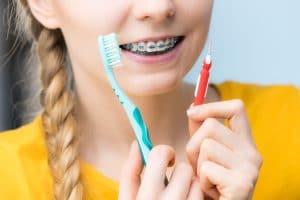You’re just starting orthodontic treatment and it’s time to brush your teeth.  Do you brush with a manual or electric toothbrush? The truth is that either type of toothbrush does an effective job of cleaning the teeth. For those of you not convinced, we’ve listed some features and benefits of each so you can decide for yourself.
Do you brush with a manual or electric toothbrush? The truth is that either type of toothbrush does an effective job of cleaning the teeth. For those of you not convinced, we’ve listed some features and benefits of each so you can decide for yourself.
Benefits of Using a Manual Toothbrush
- It’s simple, affordable and easy to find.
- Changing your brush every 3 months doesn’t hurt your pockets.
- Depending on the type of brush and your brushing method, manual toothbrushes could be softer on the tooth enamel and gums.
Benefits of Using an Electric Toothbrush
- Perfect for those with limited mobility to guarantee a good cleaning.
- Some brands have features that promote better brushing techniques (including a timer, brush intensity meter and more)
- A better, deeper clean because they are designed to produce more movement and push fluids between the teeth.
Cleaning Braces Electronically
To get the most out of an electric toothbrush while wearing braces, choose one with a small head and soft bristles. When brushing, apply gentle pressure and to allow the toothbrush to do the hard work for you. Remember to get around the bands, brackets and wires for a deep clean and healthier gums.
Cleaning Braces Manually
While an electric toothbrush can make the oral care process more efficient, that’s not to say that manual toothbrushes can’t get the job done. Manual toothbrushes are just as great at cleaning teeth as their electric counterparts, but many people do not use them properly. It is common for those using a manual toothbrush to not brush their teeth long enough to reap its benefits. For the best clean, the American Dental Association recommends brushing for a minimum of two minutes at least twice per day.
Things to Consider
No matter which toothbrush you and your orthodontist choose, there are a few things to keep in mind:
- Pick a toothbrush with soft bristles.
- Replace your brush (or brush head) every 3-4 months.
- Brush for no less than two minutes, twice a day.
- Don’t brush TOO hard or in the wrong direction; it can hurt your gums.
- Be thorough, and get all the corners. Don’t forget to dental floss in between your teeth
When in Doubt… Ask!!
If you are still unsure of which toothbrush to choose during orthodontic treatment, contact our office. Dr. Amir Davoody, Dr. Mark Hablinski and their team will work with you to suggest a toothbrush that fits both your lifestyle and the appliances you are wearing so that you can achieve the bright, healthy smile you deserve.

